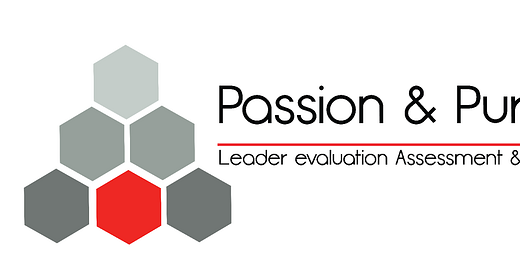Howdy, Leaders!
We took a little break, but with the academic year back in action, we’re full steam ahead over here at LeAD Labs. As such, we want to kick off a series of posts that dive into each of the six dimensions of the LeAD 6PLeadership Framework.
If you’re new here or want a refresher, definitely check out this overview post first! Then pass GO and meet us back here to dive into some applicable tips on how to start developing Passion & Purpose.
Before we begin…
Let’s talk about the framework we like to use when considering how to implement leader development.
70-20-10
The 70-20-10 framework is an easy way to break down where development comes from within the context of your work experience. You can think about it like this:
70% Work (or non-work!) Experience
20% Developmental Relationships
10% Formal Training
Notice how formal training is a pretty small piece of the pie? Let that be a reminder that you don’t need fancy, expensive training to become a successful, ethical, confident, and respected leader. Not that certifications, ongoing learning, and further education won’t move the needle––they certainly will––but they can often require the time and money many are not afforded.
Okay, great! Now that you’ve got this handy framework in your back pocket, let’s jump right in!
Within the LeAD 6PLeadership Framework, the Passion & Purpose dimension reflects the extent to which YOU see yourself as a leader, and how you feel about the way you engage in your leadership role.
At its heart, leadership begins with Passion & Purpose. What drives you as a leader? It’s the thing that gives you the intensity and persistence to achieve big goals that match your values. Specifically, passion is what pulls you toward the things that are important to you. Passion could be related to people, activities, or causes. They’re the things that motivate you from within, and bring you pleasure in work (Yes! It’s possible.)
Purpose is the intention to accomplish something personally meaningful, and is often what leads to productive engagement at work and beyond. It’s shaped by values and beliefs and drives your motivation and mission focus.
Leaders who are strong in this dimension often possess high levels of:
Meaning: They experience meaning in their life and work, with a strong desire to make a difference in the world.
Leader Identity: They view and describe themselves as a leader.
Engagement: They are enthusiastic in their role and are proud of the work they do
Do any leaders in your life come to mind reading those characteristics? Maybe it’s you! Perhaps not yet, but it’s something you want to tap into and incorporate more into your leadership.
So, how can you use the 70-20-10 framework to develop your Passion & Purpose further? Let’s explore a few activities you can do on your own, with a mentor or manager, or even facilitate for your team to develop their Passion & Purpose.
70% - LEARN FROM EXPERIENCE
These exercises will help you understand how you can leverage your own experience for insights into your passions and purpose.
Take the time to identify and reflect on significant experiences that form your personal narrative:
In five-year increments (i.e., from ages 0-5, 5-10, etc.), describe your significant life events, transitions/changes, and negative/positive trigger events.
Be sure to include the beginning, middle, and end of the event. Describe how this event impacted your current convictions, values, or passions as a leader.
When you are finished, ask yourself a few follow-up questions.
What are the major turns you have experienced in your life?
Are there any themes in the values and passions you learned?
Generate at least three ideas for how you can better enact/live your current values, beliefs, and passions as a leader.
Understand your values and their importance in your leadership role.
Engage in a “Values Sort” to gain knowledge and understanding of what values are most important to you as a leader. Select your top 30 values.
Values could include things like broad interests, challenge, creating balance in your life, creativity, curiosity, efficient work habits, enjoyment of the activity itself, faith, vision, spirituality, solitude & contemplation, teaching & mentoring, or searching for knowledge.
Arrange this list of 30 values into five columns:
4 in “Least Important”
6 in “Less Important”
10 in “Neutral”
6 in “More Important”
4 in “Most Important”
Make note of the clear decisions, the difficult decisions, and the values that are ranked lower or higher than you would expect.
Next, consider 1) Where did you learn these values? 2) When was the last time you practiced a “most important” value in your leadership? and 3) How can you practice your values more at work?
Strive for authenticity in your meaning and leadership identity.
“Authentic” leaders are not fake. They are original, they own their unique personal experiences, and they lead from their point of view. They are effective because their actions are consistent with their values. Work on living out your values through your leadership practices.
Be confident in who you are. Make sure your goals, passions, and values are aligned.
Reflect on where you learned your current “model” of – or way of thinking about – effective leadership
20% - LEARN FROM OTHERS
These exercises will help you leverage your own experience for insights into your Passion & Purpose.
Be transparent and confident in your passions, values, and meaning with others.
Ask others for input. Meet with a manager, mentor, or colleague to discuss how your values are enacted in your leadership role. They can help you understand which values align with those around you in the workplace, and identify improvements for incorporating your meaning and passion into your leadership.
Create a channel of communication for your peers and subordinates to explore their meaning and identity at work. Their reflection will be helpful for boosting engagement and overall cultivating passion and purpose throughout the organization.
Practice communicating your excitement and enthusiasm about your team’s work.
Ask for feedback from colleagues about your inspirational style and how you communicate enthusiasm. See if a trusted colleague can provide you with an example of a time when you inspired them.
The next time you work on a project, express your excitement about the vision you have for the project and how it aligns with shared values and goals.
10% - FORMAL LEARNING
Though much of leader development can be found within personal experiences, environments, and relationships, outside perspectives and professional training can be critical to deepening your Passion & Purpose.
Suggested Readings and Resources
Read Find Your Why by Simon Sinek or Watch Simon Sinek: Why You Share Your WHY
Designed to help you become inspired to find your WHY and bring it to life in both your career and organization.
Sinek discusses why writing a vision statement is important and why you must continue to grow with a WHY at your core.
Read The Profound Psychological Benefits of Leading a Purposeful Life by Brett Steenbarger.
This overview of the outcomes of leading a purposeful life can help lend importance to striving to find your purpose and how to get there.
Feeling inspired? Ready to find deeper meaning and engagement in the work you do? Let’s do it! Start with what you can learn from your own experiences and colleagues. If you still need more, LeAD Labs is here to help!







